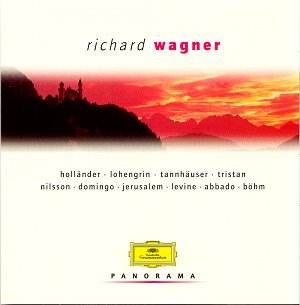WAGNER (1813-83)
Der Fliegende Holländera - Overture; Johohoe! Traft
ihr das Schiff; Steuermann, lass die Wacht. Lohengrinb - Act 1,
Prelude; Einsam in trüben Tagen; Bridal Chorus; In fernem Land.
Tannhäuserc - Overture; Dich, teure Halle; Beglückt
darf nun dich, o Heimat. Die Meistersinger von Nürnbergd
- Act 1, Prelude; Was duftet doch der Flieder; Priza Song.
Parsifale - Act 1, Prelude; Good Friday Music; Du siehst, das
ist nicht so. Tristan und Isoldef - Act 1, Prelude; Act 3, Prelude;
Mild und Leise.
 aGwyneth Jones
(soprano) Senta; Kurt Moll (bass) bHeinrich der Vogler,
eGurnemanz; bSiegfried Jerusalem (tenor) Lohengrin;
Cheryl Studer (soprano) bElsa, cElisabeth;
dDietrich Fischer-Dieskau (baritone) Sachs; Placido Domingo (tenor)
dWalther, eParsifal; fBirgit Nilsson (soprano)
Isolde;
aGwyneth Jones
(soprano) Senta; Kurt Moll (bass) bHeinrich der Vogler,
eGurnemanz; bSiegfried Jerusalem (tenor) Lohengrin;
Cheryl Studer (soprano) bElsa, cElisabeth;
dDietrich Fischer-Dieskau (baritone) Sachs; Placido Domingo (tenor)
dWalther, eParsifal; fBirgit Nilsson (soprano)
Isolde;
afBayreuth Festival Chorus and Orchestra/Karl Böhm; bVienna
State Opera Chorus and Philharmonic Orchestra/Claudio Abbado;
cChorus and Orchestra of the Royal Opera House, Covent Garden/Giuseppe
Sinopoli; dChorus and Orchestra of the Deutscher Oper, Berlin/Eugen
Jochum; eMetropolitan Opera Orchestra/James Levine. Recorded
1966-94.
 DG Panorama 469 226-2
[adfADD/DDD].
[135'17]
DG Panorama 469 226-2
[adfADD/DDD].
[135'17]
Crotchet

As sets of bleeding chunks go, this one comes pretty high in the rankings.
None of these excepts from the mature (or nearly mature), non-Ring
music dramas will seriously disappoint, and some will positively stimulate.
Karl Böhm's star fully deserves to shine high in the Wagnerian firmament,
and he duly both opens and closes this selection. His blazing Dutchman Overture,
despite showing its age in terms of recording quality, blazes with excitement.
The Bayreuth Festival Orchestra play for all they're worth (and that's a
lot). Gwyneth Jones' Johoe! Traft ihr das Schiff im Meere an is a
gripping and imposing account, whilst the Bayreuth Festival Chorus are on
top form for Steuermann, lass die Wacht. Excerpts from Böhm's
1966 Bayreuth Tristan (for many, including this critic, an experience
unlikely to be surpassed) close the set. The Preludes to Acts 1 and 3 are
tautly presented, and Birgit Nilsson's Verklärung (Mild und
Leise) is truly imposing. Anyone who does not own the complete set, should.
Claudio Abbado is less renowned for his journeys into Wagnerian realms, and
the excerpts form Lohengrin show why. Despite a pure Einsam in
trüben Tagen from Cheryl Studer and a tender Prelude to Act 1 (jut
sit back and luxuriate in the Vienna Philharmonic string sound!), Im fernen
Land lacks the mystical pregnancy it so needs, with Siegfried Jerusalem
on less than top form. Try Jess Thomas's 1962 Bayreuth account with Sawallisch
if you want to really get inside this music (Philips 446 337-2). Jerusalem
just rushes through the pivotal revelation of Mein Vater, Parzifal,
trägt seine Kröne, and the fade shortly thereafter seems cruel.
Talking of Parsifal (Wagner uses the more difficult to sing spelling of Parzifal
for its one appearance in Lohengrin, by the way), three excerpts from
Levine's ponderous account with the Metropolitan Orchestra represent this
most spiritual of works. Effective excerpts are remarkably difficult to find
(with the exception of Kundry's Ich sah das Kind, inexplicably omitted
from this set), and the lion's share here goes to the Prelude to Act 1 (which
comes in at over 15 minutes). Levine only just keeps hold of the tension,
but it's a close run thing. Perhaps, given that this is not really Domingo's
territory (he is cast as Parsifal, and also sounds out of place in the Prize
Song from Jochum's Meistersinger), that's a good thing.
As in the case of Lohengrin, the end of Jochum's Overture to Act 1
of Die Meistersinger also suffers from a disappearing into the distance
fade (rather than keep the dramatic stroke of genius of moving into the first
chorus entry). Understandable enough (it would, after all, be impossible
to append the concert ending), but frustrating nonetheless. Still, one can
still enjoy Fischer-Dieskau's Sachs, whose Fliedermonolog exemplifies
all of that singer's best qualities of sound, line and diction.
Sinopoli's recording of the Paris version of Tannhäuser remains on the
tepid side, despite a firm Dich, teure Halle from Studer and a rock-solid
Covent Garden Chorus in the Pilgrim's Chorus.
A mixed bag, then. Excerpts from Wagner are always problematical, given the
composer's insistence on the whole and complex interrelations, leitmotivic
and otherwise, within that whole. Use the most impressive snippets as an
excuse to go out and buy the complete sets.
Reviewer
Colin Clarke

